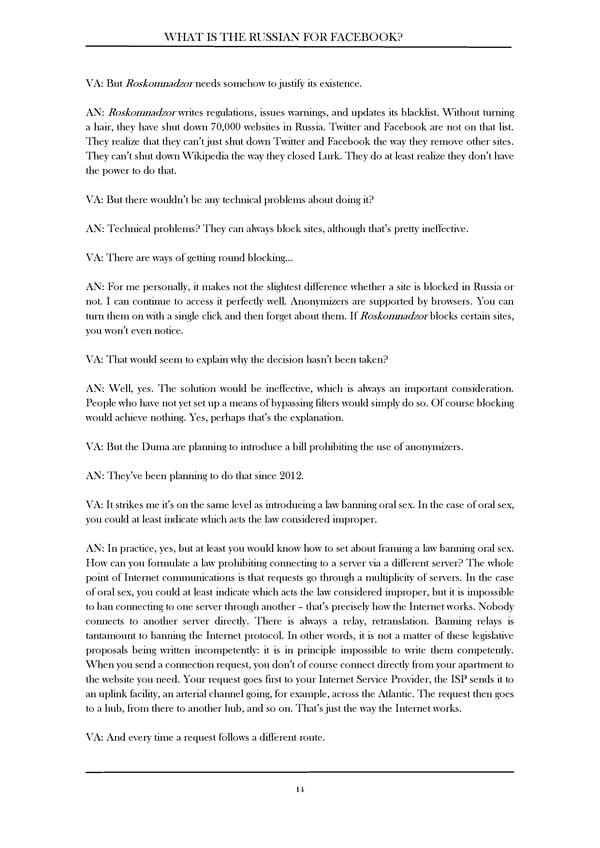WHAT IS THE RUSSIAN FOR FACEBOOK? VA: But Roskomnadzor needs somehow to justify its existence. AN: Roskomnadzor writes regulations, issues warnings, and updates its blacklist. Without turning a hair, they have shut down 70,000 websites in Russia. Twitter and Facebook are not on that list. They realize that they can’t just shut down Twitter and Facebook the way they remove other sites. They can’t shut down Wikipedia the way they closed Lurk. They do at least realize they don’t have the power to do that. VA: But there wouldn’t be any technical problems about doing it? AN: Technical problems? They can always block sites, although that’s pretty ineffective. VA: There are ways of getting round blocking... AN: For me personally, it makes not the slightest difference whether a site is blocked in Russia or not. I can continue to access it perfectly well. Anonymizers are supported by browsers. You can turn them on with a single click and then forget about them. If Roskomnadzor blocks certain sites, you won’t even notice. VA: That would seem to explain why the decision hasn’t been taken? AN: Well, yes. The solution would be ineffective, which is always an important consideration. People who have not yet set up a means of bypassing filters would simply do so. Of course blocking would achieve nothing. Yes, perhaps that’s the explanation. VA: But the Duma are planning to introduce a bill prohibiting the use of anonymizers. AN: They’ve been planning to do that since 2012. VA: It strikes me it’s on the same level as introducing a law banning oral sex. In the case of oral sex, you could at least indicate which acts the law considered improper. AN: In practice, yes, but at least you would know how to set about framing a law banning oral sex. How can you formulate a law prohibiting connecting to a server via a different server? The whole point of Internet communications is that requests go through a multiplicity of servers. In the case of oral sex, you could at least indicate which acts the law considered improper, but it is impossible to ban connecting to one server through another – that’s precisely how the Internet works. Nobody connects to another server directly. There is always a relay, retranslation. Banning relays is tantamount to banning the Internet protocol. In other words, it is not a matter of these legislative proposals being written incompetently: it is in principle impossible to write them competently. When you send a connection request, you don’t of course connect directly from your apartment to the website you need. Your request goes first to your Internet Service Provider, the ISP sends it to an uplink facility, an arterial channel going, for example, across the Atlantic. The request then goes to a hub, from there to another hub, and so on. That’s just the way the Internet works. VA: And every time a request follows a different route. 14
 What is the Russian for Facebook? Page 14 Page 16
What is the Russian for Facebook? Page 14 Page 16